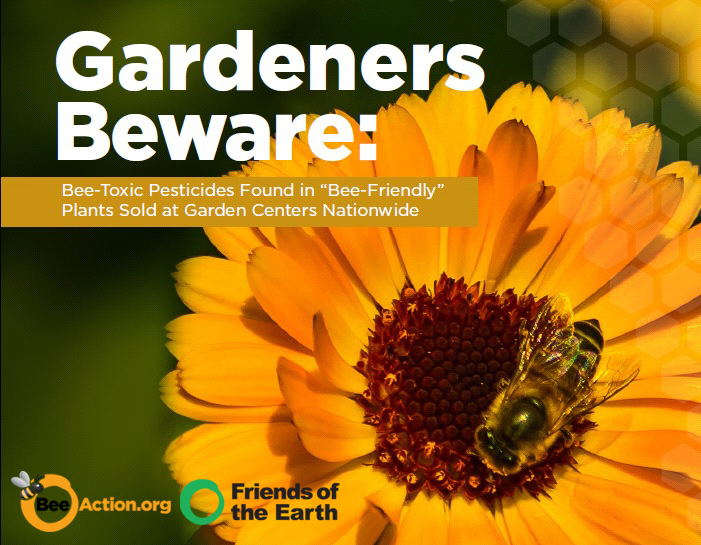
My kids and I were playing outside recently and we found a bee. Not up in the air buzzing around the flowers but down on the ground struggling to find its way, unable to fly. It wasn't the first "lost" bee that I'd seen. I started to wonder, could this have anything to do with Colony Collapse Disorder? I don't use any fertilizers or pesticides on my yard but perhaps there was something else harming bees around my house.
A new report from Friends of the Earth about how my backyard or even the smallest garden can have a huge impact on bees seems to contain the answer. So if you want to preserve the bees, which are needed to pollinate 2/3 of our food crops from apples to watermelon, and you have a lawn, plants or a garden you'd better listen up.
Most people know that public parks and agricultural areas are sprayed heavily with herbicides, pesticides and insecticides -- whatever it takes -- unless they're specifically organic, to keep bugs at bay. However, we usually think of our homes as an oasis from that toxicity. What most people don't know is that your backyard may contain persistent pesticides that may be harming bees and other pollinators (like butterflies) or garden workers (like earth worms) that are really important for the food we eat.
Although there are multiple reasons that bees are suffering there is an increasing amount of evidence showing that the widely used neonicotinoid pesticides are a major factor. "Neonics" are the most widely used systemic pesticide and they're used on over 140 crops. The European Union is so concerned about the growing body of science showing that neonics harm bees it has banned these pesticides on flowering crops.
So if your grass is green and your garden is groovy you may want to take a look closer look at the soil you purchased and any fertilizer you use. The new report shows that 54 percent of regularly bought "bee-friendly" plants sold at Home Depot, Lowe's, and Orchard Supply nurseries contain these systemic pesticides. These products aren't labeled and do a lot of harm. They don't just leech into the water supply, they grow into the very fiber of the plant into its leaves and flowers which can harm bees, butterflies, ladybugs, earthworms, even birds. The impact of these killer chemicals can last for months to years to come. While they're designed to harm insects, we also just don't know enough about what they'll do to humans over time. And, since they also end up in our food, we're all likely eating them. Daily.
If you're growing your own food to be healthy you know that bees are your best friends. And if you're growing a garden to be eco you don't want to be using pesticides. Regardless, this is important for every citizen with their own patch of grass, tomatoes or daisies. After all, everyone eats and without bees, we'd all have a pretty bland diet. (If you're wondering what the supermarket would look like without our buzzing friends take a look here.)
Now that you're aware, take these five steps to promote and protect bees in your garden:
1. Tell these stores to stop selling bee-killing plants and pesticides as stores in Europe have already done. Take action to tell Home Depot and Lowe's: We won't buy your poison plants!
2. Take a look at the garden products you've got at home and have been using. You'll want to avoid products that contain neonicotinoids: Read the labels and avoid using off-the-shelf neonicotinoid insecticides in your garden they'll usually contain acetamiprid, clothianidin, imidacloprid, and/or thiamethoxam as active ingredients. Stop using these in your yard and garden and dispose of them safely (household hazardous waste disposal or returning them to the store where you bought them). You may also want to boycott products that are made by Bayer and Syngenta, the two largest manufacturers of these off-the-shelf pesticide products.
3. Learn more and spread the word. Read the report with more tips. Share this action or share this image on Facebook. At home, you can post a sign in your yard to alert your friends that you're bee-friendly and explain what that means.
4. Contact your member of Congress and encourage them to support the Save America's Pollinators Act.
5. Ensure that you're bee-safe. Purchase only organic plant starts or grow your plants from untreated seeds in organic potting soil for your home vegetable and flower gardens. Practice bee-safe pest control: Avoid the use of systemic bee-toxic pesticides in your garden (see Appendix A in the report here) and use alternative approaches such as providing habitat to attract beneficial insects that prey on pest insects in your garden. If pest pressure is too high, use insecticidal soaps or oils and other eco-friendly pest control products.
